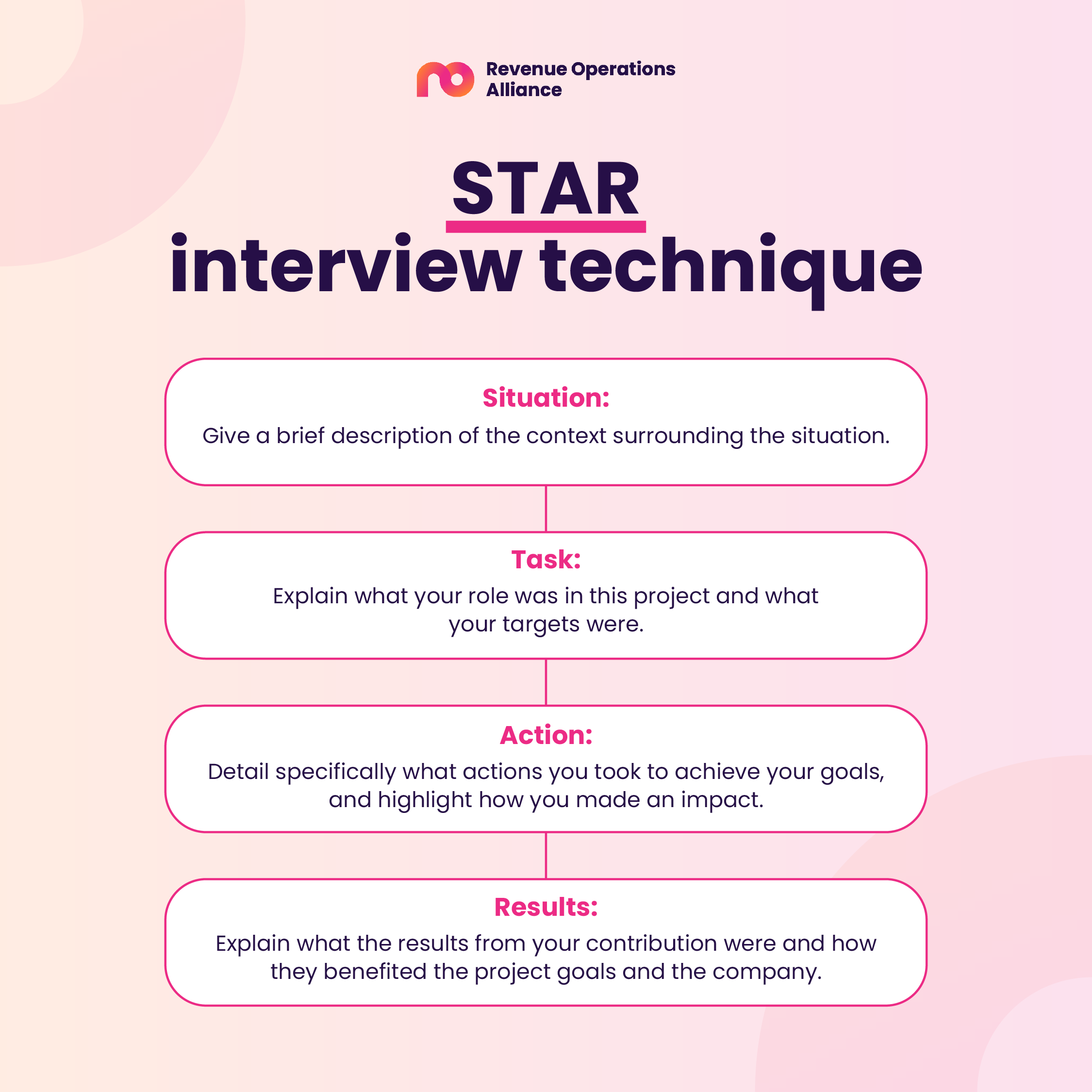Getting that new role can be tricky in today’s job market, but practicing your interview skills can make this process much easier. That’s why we’ve outlined some common interview questions for revenue operations professionals.
We also included some tips, tricks, and advice to help you blaze through your next job interview.
Explore interview questions that focus on:
Technical knowledge
Hiring managers want to know if you have the right technical knowledge to perform your job effectively. And if you haven’t used the tools in their tech stack, you should show that you understand how these tools work and that you’re capable of adapting to them.
Previous tech stack questions
These are the sorts of questions you might expect to answer around your previous experiences with certain tools:
- Which tools have you used previously?
- What is your experience with X tool?
- What is your familiarity with different CRMs?
If you have experience with a specific tool they’ve mentioned, talk about how you’ve used this tool and how involved you were with its maintenance.
But if you don’t have experience with the tool they mention, don’t panic. Inform them of a similar tool you have experience with and how involved you were with it, and emphasize that you have previously adapted well to tech stack changes.
By showing your expertise with a similar tool (and your willingness to learn) you can still gain the trust of your interviewer.

Show adaptability
Maybe the company you’re interviewing with is looking into changing some elements of their tech stack, so they ask something like:
- Describe a time when you adapted well to a new tech stack or tool.
- How have you helped teams migrate to new systems/tools in the past?
The former of these questions is similar to what you might describe in the previous scenario, so describe how you have gone about adjusting to and learning a new tool in the past. You may also want to mention if you helped to champion the change within your organization.
If asked the latter question you may want to outline how you helped sales, marketing, and/or customer success teams adapt to a change in tech stack in the past. Give details as to the training you used and what the measures of success were.
Don’t have experience with a software change? Try discussing how you’ve dealt with another type of change, such as a strategy change, to show transferable skills in this area.
Tech stack maintenance
Another area a hiring manager might ask about is how you’ve maintained the tech stack in a previous role. The phasing might sound like this:
To what extent have you been involved with the maintenance of tech stack tools?
Be honest about your involvement, and reflect on how this impacted the success of your stakeholders. If you have a short example of a tech stack problem you solved in the past, mention it here and highlight its impact.

Experience
An interviewer will also want to know about your previous work experience and your knowledge of revenue operations strategy and responsibilities. In this section, we’ll outline a few types of questions to expect.
Reporting
One of the top three activities RevOps professionals undertake is defining and measuring metrics and KPIs with 89% saying this is part of their role. So, you’ll likely be asked about reporting in a RevOps interview.
Here are some ways you could be asked:
- How would you go about creating a new report?
- What reports would you suggest for a VP of Sales? VP of marketing?
The first of these is simple, go through a step-by-step process of your thought process when creating a new report. Clarify how you would ensure the report fulfills its purpose.
Here are some suggestions if you’re asked to suggest reports for a VP of Sales or Marketing:
Sales: Forecasting and accurate revenue predictions.
Marketing: Attribution or campaign ROI.
General experience questions
Here are some more experience questions that you may be asked. Consider having an example or two for each of these questions in mind before your interview so you can easily discuss your experiences.
- What is your approach to a business intelligence problem?
- How have you been able to decrease churn in previous roles?
- Describe a time when you overcame an obstacle in your sales and/or marketing process.
- What would you say are essential KPIs for prospecting? What about pipeline?
- Walk me through an example of how you impacted the business. How did you discover the opportunity, execute on it, and ultimately how did it impact the business?
- What is your level of proficiency at streamlining and adding efficiency throughout the revenue function?

Strategic planning
True revenue operations is a strategic function - especially as you become more senior - so being able to show strategic thinking is crucial in a job interview.
Workflow management
Revenue operators are often thrown a million and one things to do so prioritization is essential to thrive in the role. An interviewer might test your workflow strategy by asking something like:
- How do you manage your workflow?
- Which kinds of tasks would require more planning?
- Which kinds of tasks could you do on the spot?
- What strategies do you use to stay prioritized and manage workflow?
Understanding your work process and how you usually prioritize tasks can be useful for answering these sorts of questions.
RevOps strategy
Getting down to the bones of RevOps is the strategy you’ll use to create change, optimize workflows, and solve problems. Here are some specific questions you might be asked about revenue strategy:
- What’s your impact analysis process for implementing change?
- How do you manage your pipeline and forecast future sales numbers accurately?
- Walk me through the annual planning process, including the order, who needs to be involved, and what the desired outcomes are.

Problem-solving
44% of RevOps professionals say problem-solving is the most important skill in a potential RevOps manager. So, it’s no surprise that questions relating to your problem-solving ability will be tested in a job interview for the role.
There are two styles a problem-solving question might be asked. The first might look something like this:
- You’ve made a mistake that should’ve been avoided, how would you handle it?
- Tell us about your investigative approach to a problem.
This style of question requires you to reflect on and describe how you would go about solving a problem. You might say that you’d clarify the problem, form initial thoughts, and test them before communicating those findings to key stakeholders. Or maybe you’d back your process up with an example.
The second style of question is a situational question, where the hiring manager will present you with a problem to talk through. Here’s an example:
Looking at this [data set or prompt] on [specific topic, eg. global expansion, new product introduction] how would you solve [specific problem, eg. customer churn, long sales cycle]?
For this style of question, you should carefully consider the information you’ve been given and try your best to solve the problem using your knowledge. Most interviewers keep these questions vague on purpose, so try not to ask too many clarifying questions.
Instead, you might say, “Assuming X then I’d suggest Y.” This shows the interviewer how you work through problems and what assumptions you might make about a problem.

Communication
Revenue operations professionals work with a wide range of stakeholders so you need to be able to communicate effectively to understand their problems and how to solve them.
Here are some example interview questions for understanding your communication skills:
- Who were your direct stakeholders previously? How closely/well did you work with them?
- How would you tackle people with different communication styles?
- If you get a basic question with little context (such as “My report isn’t working.”), how do you handle the response?
- How would you rate your level of empathy and recognition of different communication styles?

Continuous learning
Finally, RevOps is an everchanging role, so it’s important to keep up-to-date on the latest industry trends. With that in mind, you might be asked about how you learn and what resources you use.
The phrasing of this might be:
- What’s your most successful method of learning?
- How do you stay on top of industry best practices?
- What resources do you utilize to stay on top of industry trends?
If you’re reading this blog, then it’s likely that you read our blogs and reports, listen to our podcasts, or even attend our events! These are all great things to mention if you are asked these questions. 😉

Bonus advice: The STAR method
The star method of structuring your responses to interview questions comes highly recommended, no matter what field you’re interviewing for. But don’t just take our word for it, Ahmad Atari, Senior Vice President, GTM Strategy & Operations at BeyondTrust, also recommended this method in our Slack community.
The approach is simple, simply split your responses into these categories: situation, task, action, and results. This way you can easily structure your answer to an open-ended question and communicate the most important information effectively.
Let’s break down how to use this method:
Situation: Give a brief description of the context surrounding the situation. This will paint the picture of how an interviewer should envision the rest of your answer.
Task: Explain what your role was in this project and what your targets were.
Action: Detail specifically what actions and steps you took to achieve your goals. This section is where you should highlight how you made an impact.
Results: Explain what the results from your contribution were and how they benefited the project goals and the company. If you can try and give some data to support your response.

This approach helps to keep your answers brief but specific, so you should aim to include one to two sentences for each step of the framework.
Looking to stand out in the job market?
Take your revenue operations knowledge to the next level, with our new comprehensive course. Our Revenue Operations Core certification covers:
🧠 What revenue operations truly means
🙏 How to build an impactful RevOps team
🔑 The keys to tracking your team’s success
📈 How to enhance the function in your organization
And much, much more...





